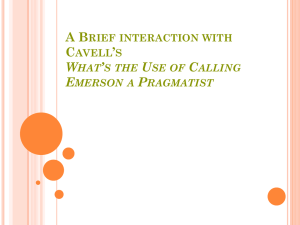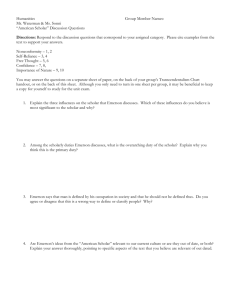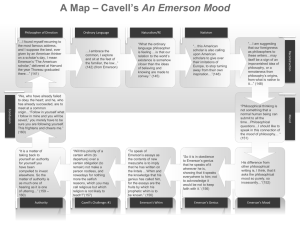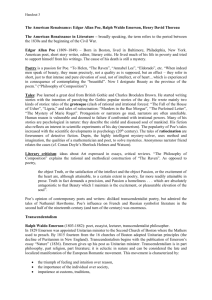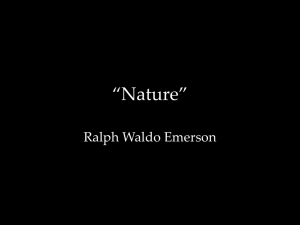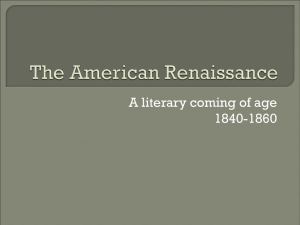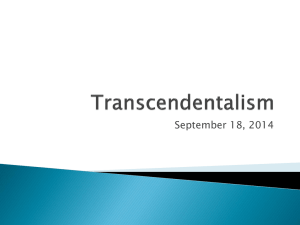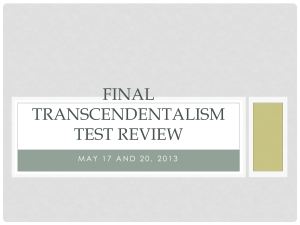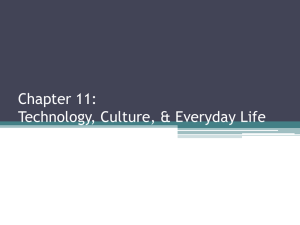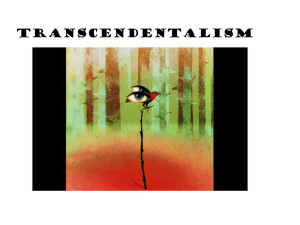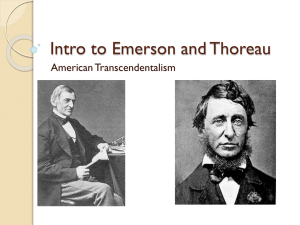English 5/4140: American Romanticism
advertisement
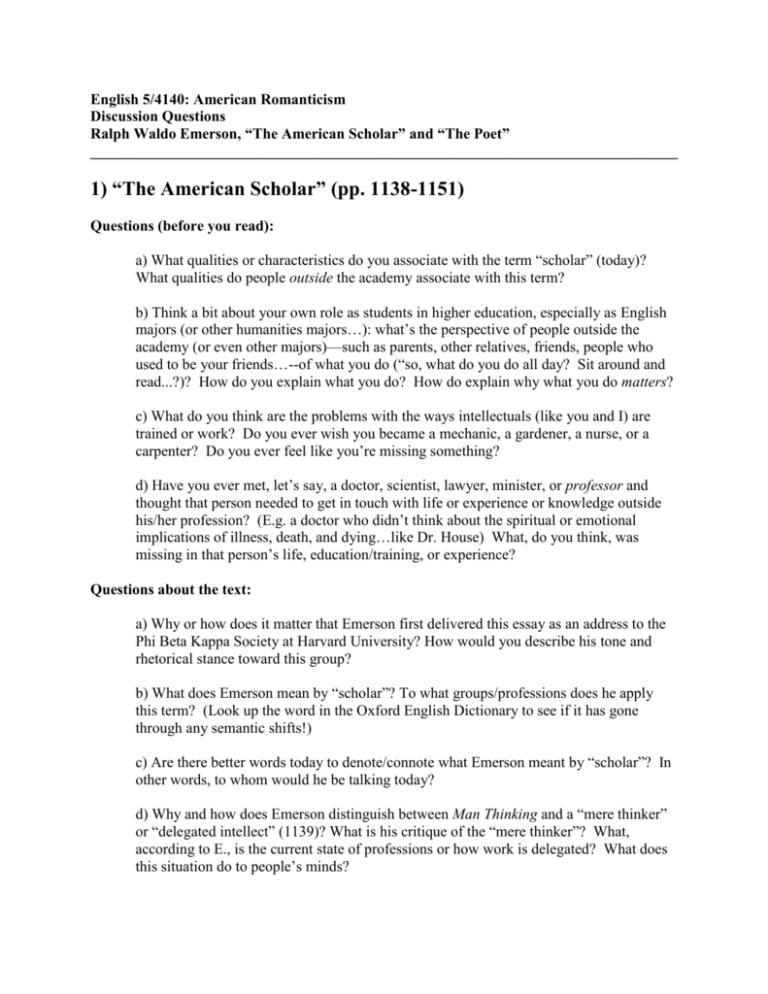
English 5/4140: American Romanticism Discussion Questions Ralph Waldo Emerson, “The American Scholar” and “The Poet” ______________________________________________________________________________ 1) “The American Scholar” (pp. 1138-1151) Questions (before you read): a) What qualities or characteristics do you associate with the term “scholar” (today)? What qualities do people outside the academy associate with this term? b) Think a bit about your own role as students in higher education, especially as English majors (or other humanities majors…): what’s the perspective of people outside the academy (or even other majors)—such as parents, other relatives, friends, people who used to be your friends…--of what you do (“so, what do you do all day? Sit around and read...?)? How do you explain what you do? How do explain why what you do matters? c) What do you think are the problems with the ways intellectuals (like you and I) are trained or work? Do you ever wish you became a mechanic, a gardener, a nurse, or a carpenter? Do you ever feel like you’re missing something? d) Have you ever met, let’s say, a doctor, scientist, lawyer, minister, or professor and thought that person needed to get in touch with life or experience or knowledge outside his/her profession? (E.g. a doctor who didn’t think about the spiritual or emotional implications of illness, death, and dying…like Dr. House) What, do you think, was missing in that person’s life, education/training, or experience? Questions about the text: a) Why or how does it matter that Emerson first delivered this essay as an address to the Phi Beta Kappa Society at Harvard University? How would you describe his tone and rhetorical stance toward this group? b) What does Emerson mean by “scholar”? To what groups/professions does he apply this term? (Look up the word in the Oxford English Dictionary to see if it has gone through any semantic shifts!) c) Are there better words today to denote/connote what Emerson meant by “scholar”? In other words, to whom would he be talking today? d) Why and how does Emerson distinguish between Man Thinking and a “mere thinker” or “delegated intellect” (1139)? What is his critique of the “mere thinker”? What, according to E., is the current state of professions or how work is delegated? What does this situation do to people’s minds? e) “Man Thinking”—Emerson’s “right state” (1139): - What are the types of “influences” on “Man Thinking”? - What are his/her duties? f) What does Emerson’s call for such a “Man Thinking” mean for his age? What are the effects on literature in particular? What are the effects on the nation? g) What, according to Emerson, should be the relationship between “Man Thinking” and society, i.e. the rest of us? After the reading/general discussion questions: a) What’s your personal response to the essay, its ideas, and Emerson’s tone? b) Did you feel at any point during this essay that there is a contradiction between a sense of or even desire for separation (i.e. of the intellectual from society) and the call for being part of the people, e.g. by gaining real experience? In other words, is Emerson more of a snob or a visionary to you? c) Can you find examples for the opposition between “delegated intellect” and “Man Thinking” in our own day? e) What would happen today/in our society if we had more “men thinking”? What would it mean for us to become “men thinking”? f) Let’s problematize Emerson’s use of the word “Man.” Do you think it’s just a generic form for person/human? Or, does he indeed mean “man” or “men” only? (We will really learn what the 19th century, including the male Transcendentalists, thought about women’s intellect, when we look at Margaret Fuller.) 2) “The Poet” (pp. 1180-1195) Questions (before you read): a) This is for everyone, but especially for creative writers (and especially for those of you specializing poetry): - What does being a “poet” mean to you? - What, for you, is the source of poetry or poetic inspiration? - How is poetic language different than prose, or everyday language? - What is the relationship between poetry and society, culture, the reader? b) How does our society usually view poets and poetry? Why do we need poets/poetry? Questions about the text: (we will use the same questions for Emerson today, and Wordsworth and Whitman next time) a) How do Wordsworth, Emerson, and Whitman define the function and significance of the poet? b) Especially, how or where does the poet receive his/her inspiration or insight? c) What is the function of the poet in society, or, in other words, what is the relationship between poetry and his fellow men/women? d) What is the function of the poet compared to religious leaders, such as ministers or priests? e) What kind of lack or deficiency do they see in American literature, specifically in poetry? What do they expect from a truly AMERICAN poet? What kind of changes or revolutions should this poet introduce? After the reading/general discussion questions: a) Again, what’s your personal response to the essay, its ideas, and Emerson’s tone?

